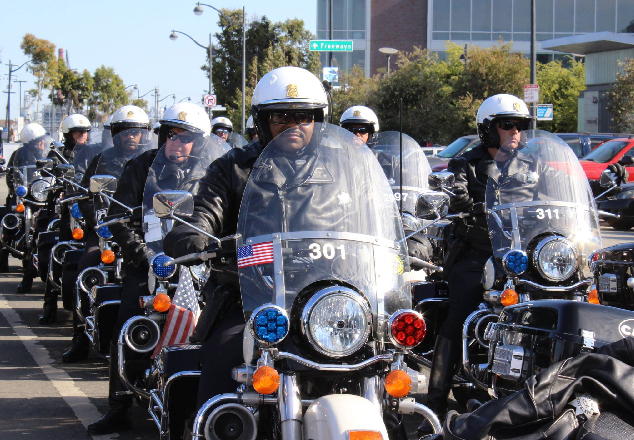
An arbitration panel has decided that the San Francisco cops don’t have to back off from their efforts to delay or block reforms and will get a nine percent raise anyway.
The decision undermines the position of the mayor, the supervisors, and many of the city’s communities, who have been frustrated by the Police Officers Association and its constant resistance to reasonable changes in department policies.

But none of the city’s elected leaders had any say in the final deal. Because the POA and the city couldn’t come to agreement on contract terms, the entire contract was turned over to an arbitration panel consisting of one city rep, one POA rep, and a professional arbitrator acceptable to both sides.
Not surprisingly, the POA rep wanted a 12 percent raise over three years – and objected to the proposal that the union refrain from using its “meet and confer” rights to block changes listed in the Justice Department’s report on SFPD policies and practices.
Carol Isen, the city’s employee relations director, represented the city on the panel; Gary Delagnes, a former president of the POA who is a now a union consultant, represented the cops. The swing vote was Arbitrator David Weinberg.
Weinberg sided with the city on the economic issues. But nobody would have made that much of a fuss over whether the cops got 3 percent a year or 4 percent a year.
The real issue was the way the reform policies will be implemented – and whether the POA will have an effective veto, or at least the ability to delay the changes for months if not years.
The issue involves the concept of “meet and confer,” which is in state labor law. Under union contracts, when management imposes changes to work rules, they have to give the union a chance to respond, and if necessary, challenge those changes.
Help us save local journalism!
Every tax-deductible donation helps us grow to cover the issues that mean the most to our community. Become a 48 Hills Hero and support the only daily progressive news source in the Bay Area.
Which is fair.
But the POA considers reforms in things like the Use of Force Policy to be issues that the city has to meet and confer over – and that’s a stretch at best. Those policies aren’t work rules (like hours in a shift); they’re life-and-death rules that are in the discretion of civilian policy makers. And the POA has consistently used “meet and confer” to delay or derail reforms.
In fact, the POA has argued that it has the right to demand arbitration over policy changes that have been outlined by the Obama-era Justice Department as best practices for the city.
The background, of course, is the long list of people, mostly young people of color, shot and killed by the SF cops over the past few years. Those killings forced the city to ask the Justice Department to come in and review what was happening at SFPD.
The city’s proposal was simple: If the issue involved one of the recommendations in the DOJ report, the POA would have 14 days to respond – but if the city and the POA didn’t agree, the POA could not demand arbitration.
The POA response was apoplectic. In both its membership journal and in Delagnes comments in the arbitration hearing, the group said that the reforms were “politically motivated” and said that Supervisors Sandra Lee Fewer, Hillary Ronen, Malia Cohen, and Norman Yee were driven by “a singular lie” when they supported the city’s position.
The POA, Delagnes said, has never opposed the reforms – a position completely at odds with his organization’s decision to put Prop. H on the ballot.
So now the POA stand on reforms becomes law, and the supervisors and the mayor have no ability to challenge it. Why?
That story goes back to 1990, when the POA urged the supervisors to put a measure on the ballot, Prop. D, that would require binding arbitration for “wages, hours benefits, and working conditions” for cops and firefighters.
Mayor Art Agnos opposed the measure; so did the police chief at the time, Frank Jordan, who argued that an “amateur” arbitrator shouldn’t make policy decisions for the Police Department. Sups. Terrence Hallinan, Nancy Walker, Willie Kennedy and Richard Hongisto voted against it. The rest, including Harry Britt, the most progressive voice on the board, voted Yes.
Dianne Feinstein supported it. So did Willie Brown.
Agnos, on the other hand, wrote that the law “overturns policies … protecting against INS [now ICE] harassment and [puts] policies prohibiting the use of rubber gloves at AIDS demonstrations (yes, the cops used to do that) and limitations on intelligence gathering in peril.” Back then, the SFPD had an intelligence unit that spied on protesters.
Prop. D, Agnos said, “jeopardizes civilian oversight.”
He was one of the few who figured this out at the time. Now, we have a situation where a law that was presented as a pro-labor measure has become a way to block reforms and keep bad, old, policies and dangerous, retrograde police procedures in place.
On the other hand, at least City Hall stood up this time and said that the way the POA is acting can’t be endorsed. None of the top candidates for mayor have sought or accepted the endorsement of the POA.
But for now, the reforms that most of the city agrees are badly needed may be delayed by a 1990 measure that passed because most of us back then had no idea what it would mean in 2018.

